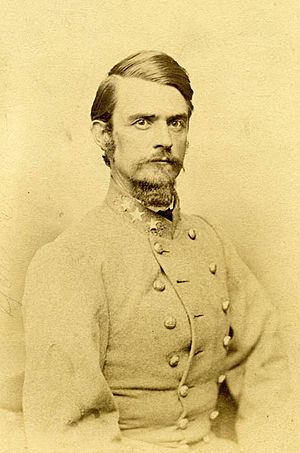John Bullock Clark Jr. facts for kids
Quick facts for kids
John Bullock Clark Jr.
|
|
|---|---|
 |
|
| Born | January 14, 1831 Fayette, Missouri, U.S. |
| Died | September 7, 1903 (aged 72) Washington, D.C., U.S. |
| Place of burial |
Rock Creek Cemetery
Washington, D.C., U.S. |
| Allegiance | |
| Service/ |
|
| Years of service | 1861–65 |
| Rank | Brigadier General |
| Battles/wars | American Civil War - Battle of Carthage (1861) - Battle of Springfield - Battle of Pea Ridge - Battle of Pleasant Hill - Price's Raid |
| Other work | U.S. Congressman from Missouri |
John Bullock Clark Jr. (born January 14, 1831 – died September 7, 1903) was an important figure in American history. He served as a general in the Confederate States Army during the American Civil War. After the war, he became a U.S. Congressman for Missouri. He served five terms in the House of Representatives.
Contents
Life Story of John Bullock Clark Jr.
Early Years and Learning
John Bullock Clark Jr. was born in Fayette, Missouri. His father, also named John Bullock Clark, was a U.S. Congressman. Young John went to Fayette Academy and the University of Missouri. He then spent two years traveling and having adventures in California.
After his travels, Clark moved to the East Coast. He graduated from the law school at Harvard University in 1854. He then became a lawyer and practiced law in his hometown of Fayette. He worked as a lawyer from 1855 until the Civil War began.
Fighting in the Civil War
When the American Civil War started, John Bullock Clark Jr. joined the Confederate Army. He began as a lieutenant and was promoted several times. He became a captain, then a major in the 6th Missouri Infantry.
Clark fought in important battles like Carthage and Springfield. He was promoted to colonel and led a group of soldiers called a brigade at the Battle of Pea Ridge. He mainly served in Missouri and Arkansas. On March 6, 1864, he became a brigadier general. He continued to fight in the western part of the war, including Price's Raid.
Life After the War
After the Civil War ended, Clark went back to being a lawyer in Fayette. People elected him as a Democrat to the U.S. Congress. He served from 1873 to 1883, for five terms.
During his time in Congress, he was the leader of the Committee on the Post Office and Post Roads. This committee dealt with mail services. In 1882, he tried to be re-elected but was not successful.
Clark then stayed in Washington, D.C.. He worked as the Clerk of the House of Representatives from 1883 to 1889. After that, he retired from politics.
He continued to practice law in Washington, D.C., until he passed away in that city. He was buried in Rock Creek Cemetery. The city of Clark, Missouri is named after him.
 | Janet Taylor Pickett |
 | Synthia Saint James |
 | Howardena Pindell |
 | Faith Ringgold |

